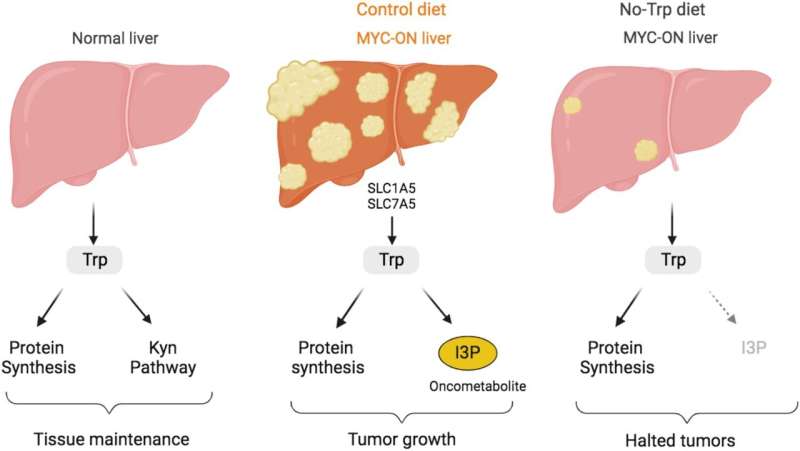This article has been reviewed according to Science X's editorial process and policies. Editors have highlighted the following attributes while ensuring the content's credibility:
fact-checked
peer-reviewed publication
trusted source
proofread
Liver cancer growth tied to tryptophan intake

Researchers at UT Southwestern Medical Center have discovered that a diet free of the amino acid tryptophan can effectively halt the growth of liver cancer in mice. Their findings, published in Nature Communications, offer new insights for dietary-based cancer treatments and highlight the critical role of the tryptophan metabolite indole 3-pyruvate (I3P) in liver tumor development.
"This work demonstrates that tailored dietary modulation may serve as a powerful adjuvant in cancer treatment," said study leader Maralice Conacci-Sorrell, Ph.D., Associate Professor of Cell Biology and Children's Medical Center Research Institute at UT Southwestern (CRI) and a member of the Cellular Networks in Cancer Research Program of the Harold C. Simmons Comprehensive Cancer Center. "It builds on our lab's discovery that the universal oncogene MYC increases the demand for tryptophan in liver tumors."
Hepatocellular carcinoma (HCC) is the third-leading cause of cancer-related mortality worldwide, according to 2020 data from the World Health Organization, with limited options for effective treatment and a five-year survival rate of about 30%. The study shows that growth of liver cancers driven by the MYC oncogene is particularly dependent on tryptophan, which is converted into I3P as well as other metabolites.
By removing tryptophan from the diet of mice, researchers stopped the growth of MYC-driven liver tumors and restored normal gene expression in liver cells. Notably, this dietary intervention did not affect protein synthesis in normal cells, suggesting a targeted therapeutic approach that spares healthy tissues.
"Liver tumors require large amounts of tryptophan to generate the oncometabolite I3P," Dr. Conacci-Sorrell said. "A tryptophan-free diet prevents liver tumor growth by a mechanism that depends on I3P but is independent of translation, the process by which proteins are synthesized from amino acid building blocks. Because tryptophan is the amino acid with the lowest abundance in the proteome, short-term dietary manipulation is safe for healthy tissues but not for cancer cells."
Among foods high in tryptophan are turkey, red meat, pork, chicken, tofu, milk, soybeans (including edamame), quinoa, oats, and fish.
The research highlights the complex role of tryptophan metabolism in cancer. While tryptophan is known to be metabolized into several important compounds, including the neurotransmitter serotonin and kynurenine, a precursor of the B vitamin niacin, the study showed that MYC-driven liver tumors preferentially utilize tryptophan to produce I3P rather than kynurenine. This shift underscores the potential for targeting specific metabolic pathways in cancer treatment.
The researchers also found that supplementation with I3P restored the growth of tryptophan-starved liver cancer cells, further emphasizing the critical role of this metabolite in cancer development. These findings suggest that targeting I3P or its production pathway could be a viable therapeutic strategy.
"This study not only advances understanding of liver cancer biology but also suggests a promising approach for developing personalized cancer therapies," Dr. Conacci-Sorrell said.
More information: Niranjan Venkateswaran et al, Tryptophan fuels MYC-dependent liver tumorigenesis through indole 3-pyruvate synthesis, Nature Communications (2024). DOI: 10.1038/s41467-024-47868-3




















